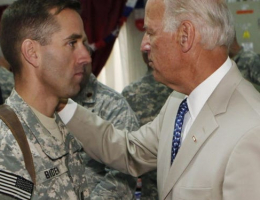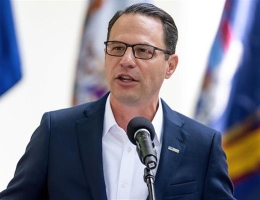On Veterans Day, how President-elect Biden's plan for the Pentagon differs from Trump
On Veterans Day, how President-elect Biden's plan for the Pentagon differs from Trump
WASHINGTON – The Pentagon under President-elect Joe Biden will face the same threats as it has under the Trump administration but will likely approach them in a different way, analysts say.
The Pentagon's massive $700 billion budget is unlikely to take deep cuts given those threats, they say. Clear breaks with Trump's approach to the military, however, are likely on social issues.
Trump's defense strategy, authored in large part by former Defense Secretary Jim Mattis, views China and Russia as the nation's principal adversaries with lesser threats posed by Iran, North Korea and terrorist groups. That view of aggressors – referred to in some military circles as the "4 + 1" threat matrix – is unlikely to change on Biden's watch.
"In fact, it has its originals in latter Obama thinking," said Michael O'Hanlon, a defense analyst at the Brookings Institution.
The 4 + 1 threat matrix, in brief
China is expected to continue to build its military and assert its influence in the Pacific, made plain by its fortification of man-made islands in the South China Sea over the last decade. U.S. forces, in turn, sail warships and fly warplanes in the region to reassure allies and show American commitment to the free flow of trade in the region.
Russia's meddling in elections in the United States and its allies, its development of advanced weapons and support for Bashar Assad in Syria continue to cause friction between the former Cold War enemies and nuclear powers.
Meanwhile, North Korea continues to build its arsenal of ballistic missiles and retain its nuclear capability that could threaten the continental United States.
In January, the U.S. and Iranian military exchanged attacks: An American drone killed Qassem Soleimani, a top general, and Iran responded with a missile attack on a U.S. base in Iraq, wounding 100 troops.
Terrorist groups, as they have since the 9/11 attacks, demand worldwide attention from the military from Africa through the Middle East.
Loren Thompson, a military analyst at the Lexington Institute, expects the Biden administration to continue to focus on those adversaries but seek more help from traditional NATO allies, which Trump has denigrated for not spending more on their defense budgets. Biden is also more apt to seek military solutions like the attack on Soleimani.
"He believes strongly in collective security, and he believes in the stability that limits on weapons, especially nuclear weapons, can foster," Thompson said. "Biden is unlikely to sustain the level of intensity in relations with China and Iran that we have seen under Trump. He will tone down the rhetoric, and look for diplomatic solutions to confrontation. China will remain a focus of concern, but U.S. policy will likely shift more toward economic measures and away from military competition."
The Pentagon's far-flung responsibilities won't change soon, and it's an expensive operation to run. Neither Thompson nor O'Hanlon foresee large cuts to the military budget, which Trump boosted to over $700 billion.
"He is a centrist Democrat who has lived through a half century of Dems being portrayed – and often misportrayed – as weak on defense by Republican rivals," O'Hanlon said. "Why would he want to give legs to that argument just to save a few billion bucks when the deficit, even after COVID recovery, is $1 trillion? Defense can’t be cut enough responsibly to make a dent in that."
During the height of the Iraq War, Biden, as a senator, championed the cause of protecting troops from roadside bombs with the deployment of Mine Resistant Ambush Protected vehicles. The program ultimately cost more than $40 billion but was credited with saving the lives of hundreds of troops.
Changes at home
Biden could put a greater emphasis on other national security threats, O'Hanlon said, including pandemics, nuclear proliferation, cyber threats and climate change.
A clear break, however, is almost certain on social issues affecting the military.
TRUMP VS. BIDEN:As Trump's troop remarks come under fire, a look at how Trump, Biden differ on military
In July 2017, Trump announced by tweet that he wanted to ban transgender troops from service. The policy took months to develop, and court challenges delayed its implementation. In the end, it fell short of banning all transgender troops, grandfathering in those in service. Democratic lawmakers support the policy that had allowed transgender troops to serve openly, which had been developed by the Obama administration and likely would be reinstated in some form under Biden.
Biden would also likely end the veneration of the Confederacy. The Pentagon has clashed with Trump over the issue. Earlier this year, Pentagon leadership moved to ban the display of imagery throughout the military that honored the southern states that seceded from the Union and fought to defend slavery. Trump has resisted the changes, particularly the 10 Army bases named after Confederate generals, saying they honor history and heritage.
Legislation in Congress has proposed that Confederate names and imagery be removed from bases, building, planes, ships and street signs within three years.
Biden's choice for Defense secretary could be Michele Flournoy, who has been considered a prime candidate for the post. Flournoy, 59, served at the Pentagon in the Obama administration as under secretary for policy, the No. 3 post there. In 2007, she co-founded the Center for a New American Security, a bipartisan think tank. Flournoy would be the first woman to lead the Defense department.
Biden will also inherit the military's senior uniformed leadership, but he is not bound to keep them. Trump appointed Army Gen. Mark Milley as chairman of the Joint Chiefs of Staff, and Air Force Gen. John Hyten as vice chairman.







.jpg)

.jpg)
